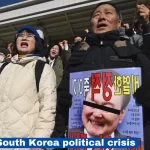UK Secretly Deports Over 600 Brazilians A Deep Dive
The UK government recently deported more than 600 Brazilians, including 109 children, through three secret charter flights. These actions, reportedly the largest in Home Office history, have sparked concerns and criticisms. Here’s a closer look at what happened, its implications, and the controversies surrounding these deportations.
Unprecedented Deportation Numbers
- Historic Scale of Flights:
The three deportation flights took place between August and September 2024, removing hundreds of Brazilians in secrecy. - 9 August: 205 individuals, including 43 children.
- 23 August: 206 individuals, with 30 children.
- 27 September: 218 individuals, including 36 children.
- Children Impacted:
Many of the children deported were integrated into UK schools and had lived most of their lives in the country. Experts argue this abrupt displacement disrupts their education and stability.
Voluntary Returns or Forced Decisions?
The government claims these deportations were voluntary. Here’s what this means:
- Incentives for Returning:
Deportees received up to £3,000 in prepaid cards, redeemable upon landing in Brazil. This offer also applied to children and infants. - Voluntary Returns on the Rise:
Between July and September 2024, over 8,000 individuals returned voluntarily or were deported, a 16% increase compared to the previous year. Of these, 6,247 cases were labeled as voluntary. - Questionable “Voluntary” Label:
Critics argue that many individuals had no choice but to accept deportation due to fears of detention, misinformation about legal rights, or safety concerns back home.
Concerns Raised by Latin American Groups
Latin American advocacy organizations are alarmed by the secretive nature of these deportations:
- Barriers to Legal Support:
Many Brazilians face challenges accessing legal advice and support in their native language, leaving them vulnerable to deportation. - Post-Brexit Impact:
Changes to immigration rules after Brexit have left Brazilians, particularly those with non-EU family members, at risk of losing their residency rights. - Gender-Based Risks:
Women experiencing domestic violence are disproportionately affected. Without proper legal protections, many are forced to return to unsafe conditions.
Case Studies Highlight Struggles
The deportations include stories of immense hardship:
- Migrant Domestic Abuse Victims:
One woman, fleeing violence with her two sons (including a disabled child), was denied legal protections under the Migrant Victim of Domestic Abuse Concession. After being shuffled between hotels, she had no choice but to return to Brazil. - Safety Concerns in Brazil:
It remains unclear how many deportees feared returning to unsafe conditions but felt pressured to leave due to limited options.
Government’s Defense and Cost-Cutting Goals
- Focus on Reducing Immigration Costs:
The Home Office defended its actions, stating they are increasing deportations to cut down on hotel and accommodation expenses. This move, they claim, will save £4 billion over two years. - Commitment to Tougher Immigration Enforcement:
A Home Office spokesperson emphasized that removals of foreign offenders and failed asylum seekers are at their highest levels in five years.
Calls for Change from Advocacy Groups
Advocacy groups are demanding reforms to protect vulnerable communities:
- Fair Immigration Policies:
Campaigners argue for affordable and safe pathways to citizenship for long-term residents. - Support for Women and Families:
Special protections are needed for women and children facing unique challenges, including abuse and lack of legal representation.
A Controversial Move
The secret deportations of Brazilians raise critical questions about immigration policies, human rights, and transparency. While the government celebrates the numbers as a success, advocacy groups highlight the human cost behind these actions. The debate underscores the need for balanced, compassionate, and clear policies to address immigration challenges.































